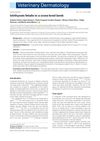 1 citations,
January 2013 in “Springer eBooks”
1 citations,
January 2013 in “Springer eBooks” Cosmeceuticals may benefit skin health but need more research for efficacy and safety confirmation.
 May 2022 in “Journal of the American Academy of Dermatology”
May 2022 in “Journal of the American Academy of Dermatology” The document suggests using a topical Vitamin D treatment for hair loss rather than oral supplements and calls for more research.
 1 citations,
November 2015 in “Indian Journal of Clinical Biochemistry”
1 citations,
November 2015 in “Indian Journal of Clinical Biochemistry” The conference presented findings on how vitamin D levels, genetic factors, and lifestyle choices like smoking and yoga affect various health conditions and diseases.
47 citations,
October 1989 in “European Journal of Pediatrics” Two siblings stayed rickets-free for 14 years after stopping treatment.
 5 citations,
July 2018 in “Pediatrics”
5 citations,
July 2018 in “Pediatrics” A 3-year-old girl developed scurvy symptoms that improved with vitamin C but relapsed when supplementation stopped.
2 citations,
December 2021 in “Cureus” Low vitamin D levels are linked to hair loss, and vitamin D might help treat it.
 28 citations,
January 2012 in “Biological & pharmaceutical bulletin”
28 citations,
January 2012 in “Biological & pharmaceutical bulletin” Hairless protein can both repress and activate vitamin D receptor functions, affecting gene regulation.
 1 citations,
May 2017 in “Journal of The American Academy of Dermatology”
1 citations,
May 2017 in “Journal of The American Academy of Dermatology” People with alopecia areata often have lower vitamin D levels than healthy people.
 1 citations,
June 2017 in “Veterinary dermatology”
1 citations,
June 2017 in “Veterinary dermatology” A cross-bred lamb with severe skin and movement issues had ichthyosis fetalis but normal vitamin A levels.
 February 2022 in “International journal of KIU”
February 2022 in “International journal of KIU” Certain genes and nutrients like vitamin D, zinc, and omega fatty acids affect COVID-19 severity and infection risk.
5 citations,
October 2021 in “Clinical, cosmetic and investigational dermatology” Japanese patients with alopecia areata often have a higher BMI and consume more vitamin C, fruit, and retinol, which may affect their condition's development or severity.
September 2012 in “DOAJ (DOAJ: Directory of Open Access Journals)”  28 citations,
December 2019 in “Skin appendage disorders”
28 citations,
December 2019 in “Skin appendage disorders” Some medications might reverse gray hair, especially those that reduce inflammation or stimulate pigment production, and vitamin B might help.
 1 citations,
June 2023 in “Nutrients”
1 citations,
June 2023 in “Nutrients” Vitamin D deficiency is linked to a higher chance of metabolic syndrome in women with PCOS.
32 citations,
January 2006 in “Liver transplantation” Vitamin A toxicity can cause severe health issues and may require a liver transplant if other treatments fail.
 6 citations,
November 2021 in “Oncology Research and Treatment”
6 citations,
November 2021 in “Oncology Research and Treatment” Low Vitamin D receptor levels in breast cancer are linked to worse outcomes and more bone metastases, and could be a marker for prognosis.
41 citations,
April 2012 in “The journal of investigative dermatology/Journal of investigative dermatology” Deleting MED1 in skin cells causes hair loss and skin changes.
51 citations,
September 2008 in “Journal of Investigative Dermatology” Vitamin D receptor may help protect against UV-induced skin cancer.
 August 2023 in “İzmir tepecik eğitim hastanesi dergisi”
August 2023 in “İzmir tepecik eğitim hastanesi dergisi” Vitamin D levels do not significantly relate to the causes of PCOS or DOR in infertile patients.
18 citations,
November 2009 in “Calcified tissue international” A genetic mutation caused severe rickets and alopecia in an Indian patient, but high-dose calcium and phosphate treatment improved their condition.
 18 citations,
January 2004 in “Dermatologic Clinics”
18 citations,
January 2004 in “Dermatologic Clinics” Skin problems in older people can indicate hormonal diseases, nutritional deficiencies, or conditions like diabetes, menopause, and HIV.
28 citations,
March 1986 in “The American journal of medicine” Too much vitamin A can cause liver damage and skin issues.
2 citations,
December 2018 in “Қазақстанның клиникалық медицинасы” Higher Vitamin-D levels may help treat certain types of hair loss.
 1 citations,
March 2014 in “Senses and Sciences”
1 citations,
March 2014 in “Senses and Sciences” A supplement with Serenoa repens improved hair loss in a patient.
 May 2017 in “American Society of Health-System Pharmacists eBooks”
May 2017 in “American Society of Health-System Pharmacists eBooks”  108 citations,
October 2004 in “Anesthesiology”
108 citations,
October 2004 in “Anesthesiology” Preoperative pain assessment, regional anesthesia, and vitamin C can help prevent CRPS after surgery.
 21 citations,
September 2018 in “International journal of women’s dermatology”
21 citations,
September 2018 in “International journal of women’s dermatology” People with Lichen planopilaris are more likely to have certain autoimmune and endocrine disorders but less likely to have conditions like allergies and diabetes.
 September 2024 in “Journal of Family Medicine and Primary Care”
September 2024 in “Journal of Family Medicine and Primary Care” Primary health physicians in Saudi Arabia need better guidelines for treating hair loss with vitamins and minerals.
8 citations,
March 2011 in “Endocrine” A new gene mutation causes vitamin D-resistant rickets and hair loss in two siblings.
Raising serum ferritin levels can improve symptoms like fatigue and hair loss, even if hemoglobin levels are normal.


















